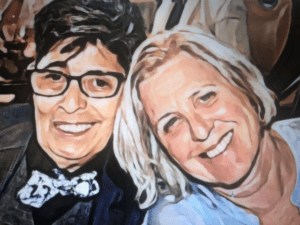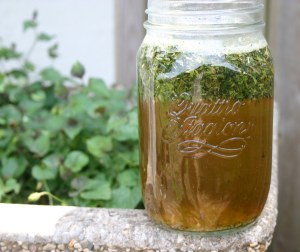
Marry Me, Marry Me, Marry Me
My beloved and I stood side by side on a large expanse of grass, the kind of formal garden my mother loved. In August, they must have been watering every day, since the abundant annual flowers in the border beds were all standing at attention, bright in their splendor.
Our dogs seemed to know they were here as witnesses. They sat in front of us, ready to endorse the occasion. When we’d arrived, they had bounded through this heaven of a backyard, rolling in the grass, and nosing each other playfully. Now it was down to business.
We had chosen the officiant online, opting for the traditional service. (They’d told us we had to pick an official set of vows out of three possibilities. Did they fear that if there was deviation, some member of a duo would contest the marriage because it didn’t conform? Anyway, we were here on a lark, and what did it matter?)
We both knew our anniversary would always be May 9, the day my American Baptist minister father declared us married before God. It doesn’t get more real than that! We promised forever, even beyond death do us part. When we said the word “forever” a few couples in attendance looked visibly disturbed, moving a little further away from each other. They weren’t prepared to take a step like that.
Our families, both chosen and biological, had helped us pull it off. The sisters-in-laws decorated, and one was our wedding photographer, even though we had inconveniently chosen to get married on her birthday. Our youngest child joined her cousins as a flower girl, nephews on both sides bore the rings (way too few rings for the crowd of nephews) and our oldest child and niece were maids of honor. Members of our spiritual community arranged, and blessed, the altar and offered the prayers.
Later, we would hear that right after the ceremony, one of Deb’s sisters turned to another and said, “this is the most beautiful wedding I’ve ever been to,” and the other replied, “of course; two women planned it.”
The change in status for each of us was immediate. It was as if someone had sent out a memo that said, “they’re married now. Act accordingly.” Everyone did. Even down to making sure Deb had purchased life insurance should anything happen. In her family’s eyes she was responsible for us now.
Five years later here we were with total strangers in their back yard ready to make honest women of each other. We had chosen Vancouver because we figured it was a liberal place and Canada had, just a few months before, legalized same sex marriage. Maybe the population hadn’t had time to adjust yet. We’d have a better chance of acceptance there, we thought. We didn’t know that NORTH Vancouver was an entirely different location, a suburb and perhaps not as progressive. We’d pulled up to the split level worried, regardless of the officiant knowing in advance that we were two women. Then there was the matter of witnesses. The dogs did not legally qualify, and our celebrant had said when we emailed her that her husband and a friend could do it. Were we going to become legal with a few uncomfortable people getting through it as quickly as possible?
But all our fears were mute as soon as we stepped into the yard. All three seemed genuinely happy for us and thrilled to be asked to do it. They cut a picture of suburban life, dressed in suits and grey haired around the edges. All three looked to be 50 or so. They took a picture (which somehow got lost before we made it home) and helped us pick the most beautiful spot in the yard.
Both of us having been out as lesbians since our teens, we were dumbstruck by the level of acceptance we’d felt since our arrival in British Columbia. The Airbnb host asked what brought us to Vancouver and when we said, “we’re getting married;” the whole place cheered. When we went to the local pharmacy to get our marriage license (yes, that’s where you get them there) the clerk fell all over herself to apologize for the form, which hadn’t been updated yet.
“I am SO sorry, one of you will have to sign where it says ‘husband’ and the other ‘wife.’”
“Why don’t I be the husband for today,” I quipped, giving my bride a laugh. As the more butch of the two of us, I was the less obvious choice.
Now in the appointed location, we had reached the vows for the day. And because they had always been denied us, and because of both of our losses (my first wife, her father) they had special meaning. We both knew what true commitment looked like. I had escorted my wife all the way to death’s door. Her mother, her seven siblings and their spouses had done the same for her father.
“I, Cheryl, take
thee, Deb to be my wedded wife, to have and to hold from this day forward, for better, for worse, for richer, for poorer, in sickness and in health, to love and to cherish, till death do us part. This is my solemn vow.”
Living my whole adult life without access to something every heterosexual person had (hardly thinking about it) had led me over the years to a deep investigation of marriage itself. During my first wife’s decade of illness I had been ignored, misidentified as a friend, and feared being banned from the room all the many times she was hospitalized. What had I learned along the way?
First, I learned to live without marriage and imagine, over time, it wasn’t important or could be replaced. We had claimed our right to be married by having a wedding ceremony without the law. We believed this to be more than enough. I was not aware of anything personally missing, except the actual legal rights that came along with legal marriage.
Second, I had thought long and hard about why it was important to have the right granted to all of us; why it was worth fighting for. If one person has a right another does not, it invites a “less than” psychology. It is hard to know what that leads to for any given person, but I believe it leads to higher rates of depression, suicide, addiction, and illness. It was impossible to believe my community was truly equal because we weren’t.
Third I investigated whether the government should be involved in marriage at all. I had decided that it should not have a religious aspect but yes, I wanted to live in a world in which governments supports love and commitment. We agree to take of each other and society agrees to bestow some rights that refer to the responsibility.
Finally, standing there and saying those words I realized, immediately, that having the legal right to marry cradled our marriage in the arms of a culture, a nation, a world. The feeling of being a full member of my social world hit like a clap of thunder, making a loud noise, and catching me unawares.
Months after Deb and I met, we wrote vows that were nearly identical to the ones we later said on our wedding day.
I commit to you, mind, body and soul, forever
I commit to cherish you in each moment wholly
I commit to find my truth so that I can share it fully with you
I commit to be faithful to you in all things
I commit to be as kind as possible in each moment, especially when we have difficulties
I commit to claim you as my one true love
I commit to take your family as my own
I commit to share my family with you as your own
I commit to use every resource I have to meet you in this love
I commit to keep Spirit alive between us
That first time, only a few months after our love at first sight, cemented us together for life. That was all we needed to seal our vow. But when we gathered our families and our community to exchange these words, it placed us within our personal context. We were now a family for our children, with our in-laws. When I danced the money dance with Deb’s grandmother it placed me in her lineage. When my father married us, it placed her in mine.
But when we went to Canada on a lark and exchanged legal vows, it placed us in our society. We would go on to become legal spouses in the US and in locations around the world and each right we gained had an impact. It mattered.
We had a renewal party when California legalized. We renewed our vows at Oakland City Hall when our marriage became legal in the whole country. We would have been glad to get married again all those times, but a little research disappointed us with the fact that even if you marry the same person again, it is bigamy. Oh well! Can’t have everything.
Our way is certainly not for everyone. I have no opinion on whether queer people should or shouldn’t commit for life, get married, have children. That is the most personal decision I can think of. But I know that it changes the world whenever a disenfranchised group of people gain the rights others have always had.
As we head into the season where so many of the important occasions in our marriage happened, I want to scream PLEASE; don’t rescind a right that is so important to so many. Yes, legal marriage offers protections available no other way and rights that matter. Even more, how we feel about ourselves is affected by how we are treated. History has shown that attitudes are influenced by a change in the laws affecting a group of people. For me, the most important influence is internal, how each of us sees ourselves in the context of our world.
Society has a part to play in affirming for each person that they have access to all the rights available to anyone else. That is worth fighting for.





